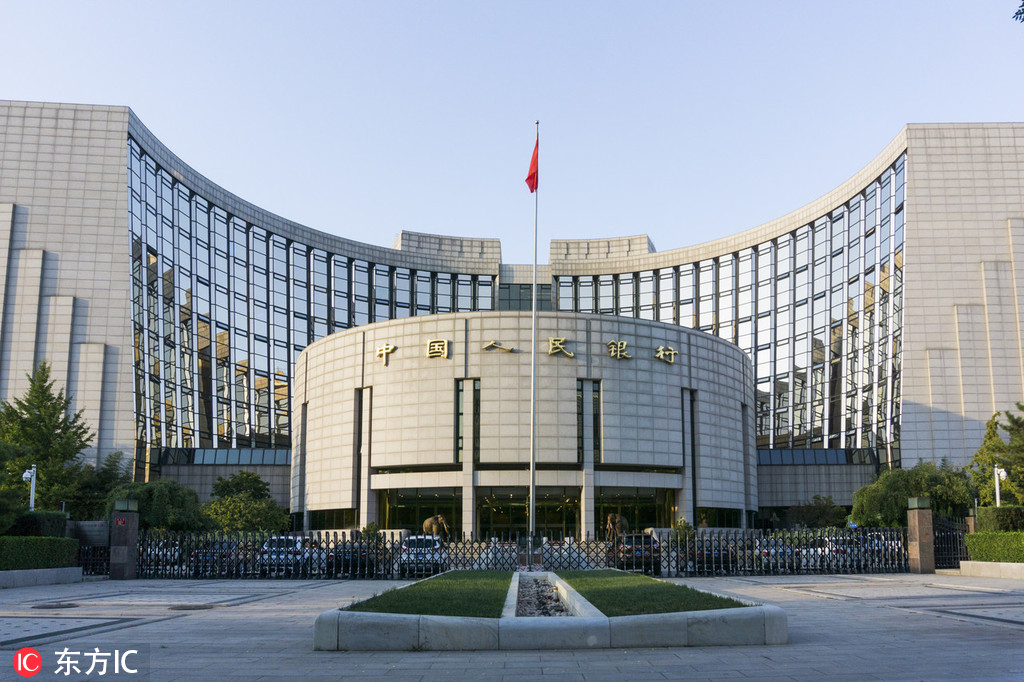PBOC issues its first bond swap program


Commercial banks facing shortfall in meeting risk buffer requirements
China's central bank launched its first swap program on Wednesday to transform 1.5 billion yuan ($223 million) of perpetual bonds into central bank bills, a measure to support recapitalization for commercial banks and cushion risks, according to an official statement.
The scheme was designed as Chinese commercial banks are facing a shortfall in complying with risk buffer requirements as the authorities are prone to proactively increase lending to small and private companies.
The capital replenishment has come under further pressure as Chinese financial regulators' crackdown on shadow banking activities has increased banks' risk exposure recorded on balance sheets.
The swap program is intended to improve the liquidity of perpetual bonds, or bonds with no maturity date, making them more attractive to investors and potentially cheaper for banks to issue, according to analysts.
A statement from the open-market operations office of the People's Bank of China, the central bank, said on Wednesday that primary dealers can shift perpetual bonds into central bank bills worth 1.5 billion yuan in total, for holding the bills for one year with a coupon rate of 2.45 percent.
Participants in the swap program include joint-stock banks, policy banks, city commercial banks, as well as securities companies, said the statement. Bank of China is currently the only issuer of perpetual bonds in China-40 billion yuan worth of the bonds were issued on Jan 25.
The central bank has no responsibility to pay the bonds' principal and interest. The central bank bills cannot be traded as common bonds, but can be pledged as collaterals, the central bank said.
"Clearly the first swap is a small amount, compared with the potential issuance of perpetual bonds that could be more than 1.08 trillion yuan as we estimated," said Jiang Chao, an economist with Haitong Securities, an A-share listed brokerage. "That could support credit growth of 6.82 trillion yuan."
Issuing bonds with no maturity date is a common and mature approach for commercial banks in other countries, especially for global systemically important banks to strengthen their loss-absorbing capacity, said analysts.
From 2016 to 2018, the total perpetual bond issuance in global markets was about $100 billion, according to data collected by the PBOC.
Through the swap scheme, the central bank can provide liquidity to perpetual bond issuers, but without taking credit risks or providing base money, "thus it is not a measure of quantitative easing", said Sun Guofeng, head of the PBOC Monetary Policy Department.
"Besides using perpetual bonds, commercial banks have plenty of measures to replenish capital, and they can decide the proper way and time to launch the instruments depending on specific capital structure," Pan Gongsheng, deputy governor of the PBOC and director of the State Administration of Foreign Exchange, said at a news conference on Tuesday.
Fitch Ratings, one of the world's big three ratings agencies, said that China's banking system's capitalization has struggled to keep pace with credit growth and risk appetite.
Chinese top-level policymakers keep urging banks and other financial institutions to create "new ways" for supporting small and private companies, given their importance in stabilizing the overall economy amid downward pressure.
Bank lending, especially from State-owned large banks, surged quickly at an unexpected pace in January, reaching a historic high of 3.23 trillion yuan.
Issuing common equity is always seen as the best choice to add capital for absorbing losses, but Chinese regulations make public share issuance difficult for banks.
"The limited depth and breadth of investors in China is a challenge for banks looking to issue capital in the domestic market," said Grace Wu, senior director of Financial Institutions with Fitch (Hong Kong) Ltd.
"The option to issue perpetual bonds-rather than preferred stock or equity-will open up the investor base," she said.
According to the financial regulation, banks' perpetual bonds with domestic ratings of at least ' "A" can be included as collateral for medium-term lending facilities (MLF), targeted medium-term lending facilities (TMLF), standing lending facilities (SLF) and re-lending with the central bank.



































